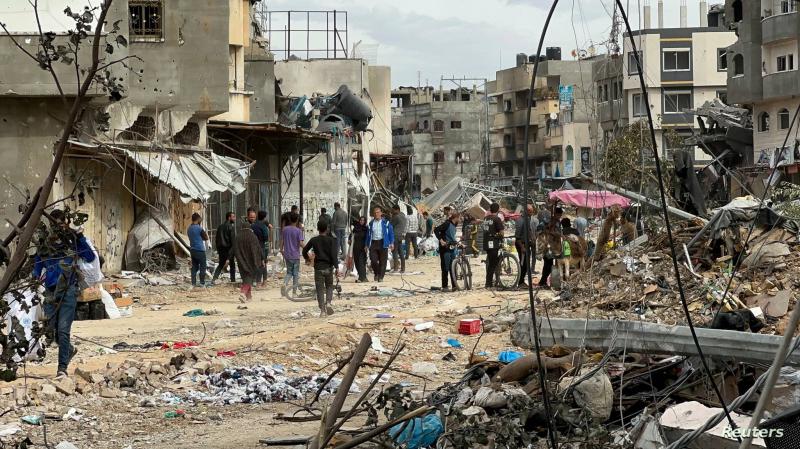The ceasefire has fallen, and the field has returned to its previous intensity, with Israel resuming its operations in the Gaza Strip. The previous ceasefire was extended seven times, and with each extension, the notion of a long-term ceasefire was proposed.
What does this mean? The idea of a long-term ceasefire between Palestinians and Israel emerged in the early 1990s. The first to mention it was Moussa Abu Marzouk, who headed the political bureau of Hamas, in February 1994, in a statement published by Al-Sabeel weekly in Amman, which is affiliated with the Jordanian Islamic movement. This concept was similarly adopted within Palestine around the same time by Hamas founder Sheikh Ahmed Yassin from his prison cell, where he proposed the ceasefire as a temporary solution to the Palestinian-Israeli conflict. According to the British website "Middle East Eye," "the ceasefire in Islamic jurisprudence is a legitimate and binding contract aimed at halting combat with the enemy for a mutually agreed time period, which can be short or long, depending on needs and common interests. Such a treaty would differ from the Oslo peace accords, under which the Palestine Liberation Organization recognized the state of Israel and its right to exist. The difference here is that the issue of recognition would not be raised under the ceasefire, as Hamas does not have the authority to relinquish the rights of Palestinians to return to the lands and homes from which they were forcibly expelled in 1948 or at any time thereafter."
According to the website, "under current circumstances, the best the ceasefire could achieve is the recovery of some lost territories and securing the release of prisoners in exchange for halting hostilities. This would be somewhat akin to the Irish Republican Army (IRA) agreeing to negotiate to end the conflict in Northern Ireland without recognizing British sovereignty over the region. Once the ceasefire is established, it is considered sacred, and fulfilling its obligations becomes a religious duty. As long as the other party adheres to it, the Muslim side cannot violate it. Like other international treaties, the ceasefire can be renewed upon mutual agreement once it expires."
The website continued, "the long-term ceasefire previously proposed by Hamas calls for an Israeli withdrawal to the 1967 borders, meaning the return of all territories occupied by Israel in the Six-Day War, including East Jerusalem, which necessitates removing all Jewish settlers from these areas. Furthermore, Israel would have to release all Palestinian prisoners. Under the current situation, it is unlikely that Hamas would accept anything less in exchange for a long-term ceasefire that might last for a quarter of a century or more."
According to the site, "there have been at least three occasions when Hamas and other Palestinian factions declared temporary ceasefires, commonly referred to as 'calm.' One occurred during the Cairo talks in March 2005, which was supposed to last until the end of 2005 but extended significantly beyond that. The first ceasefire was in 2002, mediated by EU envoy Alistair Crook, but it was halted within weeks when Israel assassinated Hamas leader Salah Shehadeh on July 22, 2002. Then, on June 29, 2003, Hamas and Islamic Jihad unilaterally announced another ceasefire, with Hamas leader Abdel Aziz al-Rantisi explaining that it was a gesture to give newly appointed Prime Minister Mahmoud Abbas a chance to settle matters with the Israelis."
The site added, "the unilateral ceasefire ended after seven weeks when Israeli forces raided the Aida refugee camp on August 8, 2003, to arrest Hamas members, resulting in the deaths of four Palestinians. In response, a bus was bombed in Jerusalem on August 19, 2003, killing around 20 Israelis and injuring dozens more. This was followed by Israel's assassination of Hamas leader Ismail Abu Shanab on August 21, 2003. In fact, it seems the Israelis did not acknowledge or appreciate the unilateral ceasefire declared by the armed Palestinian factions, and Israel's refusal to respond reciprocally led many Palestinians to lose faith in the viability of declaring a unilateral ceasefire."
According to the site, "Hamas has not indicated what would happen after the long-term ceasefire signed with the Israelis ends. Such a deal is likely to last for a quarter of a century or more, a period long enough that no one can predict what might happen afterward. Furthermore, there is always the possibility that the ceasefire could end prematurely due to a violation. It is also possible that after 20 or 30 years of peace in the region, much may change in the world such that Israel, as a Zionist entity, may not wish or may not have the capacity to operate as it does today."
The site concluded, "those who are skeptical of the ceasefire may argue that it is merely a prelude to the elimination of Israel. In reality, the ceasefire would bring an end to bloodshed and suffering for a certain period while allowing each side to dream of the future they might desire, keeping the door open for all options."




